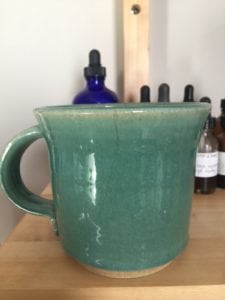Not Everything Is Going To Be Perfect.
who are carefully noticing that what we eat or how we sleep or how we live affects our well-being,
who are researching and learning about ways to be healthier:
Often there is an expectation, not always consciously, that if we Do All The Things, we will achieve “perfect health”. Or to put it another way, that if we Do All The Things, we should not experience imperfect health. And to carry that out to its logical end, that if there is imperfect health, clearly All The Things have not yet been done. Unfortunately, it doesn’t work that way, and this mindset, even if (or especially if) it’s subconscious, can really get us into a place of distress.
Let me offer a couple examples:
I have a long-time client who was born with autoimmune kidney disease. Over the years, her efforts at improving her diet, her sleep, her stress levels, and her use of nutritive and tonic herbs over the long term has lead to a drastic improvement in her health. A lab measure of kidney health is how much protein is in the urine, and where her levels used to be two to three thousand, they’re now down to two to three hundred. A “healthy” person’s level would be single digits, but in her case, these numbers are tremendously encouraging, and her doctors think so too. It took her a few years to get down to that point, and now she’s feeling anxious because her lab numbers seem to have “plateaued”. What more can she do, she asks, to get her numbers to be “perfect”?
Maybe nothing.
Perhaps her kidneys will continue improving – after all, they say that the last 20% of any particular effort takes as long as the first 80% of the effort. Maybe her improvement hasn’t stopped, but it will just take longer to achieve the last couple hundred points down to single digits. Or maybe this is the best it will be, and if that’s how it turns out, that doesn’t mean she did something wrong. It means she was born with compromised kidney health, and she took a lot of actions to create a lifestyle that supports her kidneys, and because of that, she has improved dramatically – but she still has compromised kidneys.
Another client I’ve been working with for several years currently has pain, swelling, and discomfort in the knees. While it’s true that this client has had Lyme in the past, she also was a habitual marathon runner, a vegan for more than 10 years, has chosen to live in very rustic conditions, works as a farmer, sleeps very little, and in the past year has additionally started working full time in retail, which involves standing all day on concrete surfaces and driving 3-4 hours daily to commute. Although she had no other apparently Lyme symptoms, when the pain and swelling in her knees started, she assumed it was a Lyme relapse. One of her major methods of controlling Lyme is to choose her foods very carefully, and she’d been quite consistent with those parameters before this incident with her knees. She became somewhat frantic: what more could she remove from her diet to fix this problem?Nothing! She was eating fish, vegetables, fruits, good fats, and almost no sugar: her diet was already great! Perhaps she could get more sleep, and perhaps she could modify her schedule or work environment such that she is not standing on concrete for a full day, days in a row. But the reality is that her knees have been a weak point for a very long time, and even without a potential Lyme complication, there were decades of stress on them that no amount of “perfect eating” will fully recover.
Casting about to find the “sin” in her food, or to find new measures of austerity, isn’t necessarily going to be able to remove decades of marathons: from here on out, she is likely going to have to baby her knees a little bit.
But the key is, there’s actually nothing wrong with that.
Consider this mug. It’s one of my very favorites! I bought it at the Norwich Farmer’s Market in Norwich, VT, from a farmer who has a pottery wheel in his barn. He was there with his vegetables, and on one end of a table was a row of mugs, all glazed in the same color (because that’s the color glaze he had!). He wouldn’t necessarily strike you as a potter or an artisan (what exactly is one of those supposed to look like?) but his work was fantastic. The mug is as old as my daughter, and over those 14 years, somewhere along the line, hairline fractures appeared.Eventually, the mug will break along those lines, but I love this mug.
So I baby it. I use it only on really bad days, when I need an extra pick-me-up, or really good days, when I feel like celebrating. I wash it carefully by hand, and never let it sit in the sink. I keep it at the back of the shelf. I pre-warm it before I pour in steaming hot tea.
And yet, someday this mug is going to break, and no amount of careful washing and pre-warming can stop that from happening, ultimately. My efforts can likely ensure that it will happen later, rather than sooner, but eventually it will happen.
Paul Bergner likes to say, We’re born into fixer-uppers. We fix them up as long as we can, and when we can’t fix them up anymore, we pass from this life.
You weren’t born perfect.
It’s not possible to create some perfect state in your body – it never existed and you can’t create it through effort or discipline. You CAN live a life that supports your body better, that irritates your weaknesses less, that allows the things that are strong in your body to be stronger. You CAN improve function, and cool inflammation, and repair damage. But you’re still just fixing up your fixer-upper, and the weaknesses in your body are what they are.
And there’s a beauty in that.
Life isn’t for being perfect, and it’s not for being happy and healthy and pain free and perfect all of the time. Life includes discomfort! Life also includes death!
This feeling that if only I do all the right things, I can be free of imperfect health is more like religious thinking than anything else: if only I don’t commit the sin of sugar/gluten/dairy/whatever, I will live free of pain.
It’s a fine line: yes, those things we’re working to avoid often DO aggravate weaknesses in our bodies, and yes, avoiding them DOES help us to feel better, and can indeed help repair damage and restore function. So when we don’t feel good, it’s natural that we want to find the cause, and that we expect that it’s something we did, and we label that thing “wrong”. And often we can actually point to something that we did in fact do to cause the aggravation:pizza causes heartburn ->
pizza is to be avoided ->
oops – pizza was not avoided ->
ow – now there is heartburn.
Because this pattern is often the root of discomfort, and because it’s great to learn from that and change our behaviors, we can start to believe that any time there is discomfort, we will find the pattern and resolve the problem. Many times we can!
But in truth, we’re all fixer-uppers.
And in truth, there are some things beyond our control: the weaknesses we were born with, the damage to our environment, the decisions that were made for us before our age of autonomy… There’s a lot we can control, and we should be diligent in facing those things honestly, and striving to achieve them. But we can’t control everything, and sometimes not everything is going to be perfect.
1 Comments
Leave a Comment
You must be logged in to post a comment.

Join our newsletter for more herby goodness!
Get our newsletter delivered right to your inbox. You'll be first to hear about free mini-courses, podcast episodes, and other goodies about holistic herbalism.





Beautifully written and so relevant!!